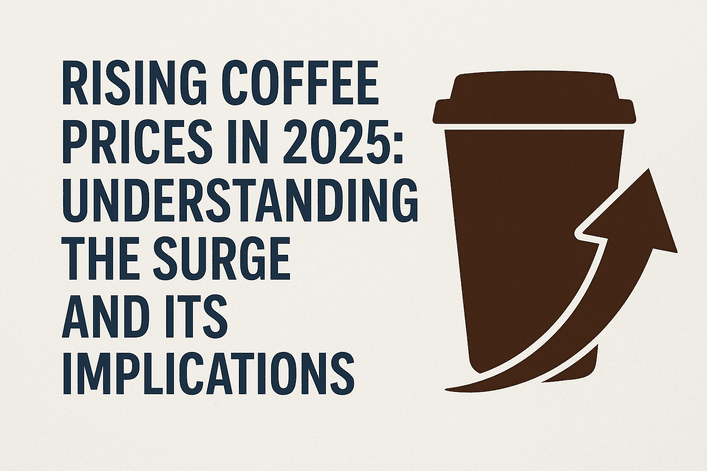In 2025, the global coffee industry is experiencing a notable increase in prices, impacting businesses and consumers alike. This trend is not solely attributed to inflation but is the result of a complex interplay of factors affecting coffee production, distribution, and consumption worldwide.
Key Factors Contributing to the Price Increase
1. Climate Change Affecting Major Coffee-Producing Regions
Climate change has significantly disrupted coffee cultivation, especially in leading producing countries like Brazil and Vietnam. Brazil, the world’s largest coffee exporter, has faced severe droughts and unexpected frosts, leading to substantial crop losses. Similarly, Vietnam has experienced erratic weather patterns, including droughts and floods, adversely affecting its coffee output. These climatic challenges have reduced global coffee supplies, pushing prices upward.
2. Increased Global Demand
While supply faces constraints, global demand for coffee continues to rise. Emerging markets, particularly in Asia, have seen a surge in coffee consumption. For instance, China’s coffee consumption has grown by 150% over the past decade, transitioning from a tea-dominated culture to embracing coffee. This heightened demand intensifies the pressure on already strained supplies.
3. Supply Chain Disruptions
Global supply chains have faced unprecedented challenges, including shipping delays, labor shortages, and increased transportation costs. Geopolitical tensions and trade restrictions have further complicated the movement of coffee beans from farms to consumers, contributing to price hikes.
4. Speculation in Commodity Markets
The coffee market has also been influenced by speculative trading. Investors betting on coffee futures can cause price volatility, leading to sudden spikes that don’t necessarily reflect immediate supply and demand realities.
The Rise of Coffee Culture Amidst Price Surges
Despite increasing prices, coffee culture continues to flourish globally. Specialty coffee shops are thriving, and consumers are more interested than ever in the origins, brewing methods, and ethical sourcing of their coffee. This cultural shift indicates that many are willing to pay a premium for quality and sustainability.
In countries like India, the coffee scene is evolving rapidly. Urban centers have witnessed a boom in artisanal cafes and a growing appreciation for diverse brewing techniques, reflecting a broader global trend of valuing coffee as an experience rather than just a beverage.
Implications for Businesses and Consumers
For businesses, the rising cost of coffee underscores the importance of understanding the journey from bean to cup. Supporting local roasters and cafes that prioritize ethical sourcing and sustainability can make a difference. Additionally, exploring home brewing methods can offer both economic and experiential benefits.
The increasing price of coffee is a multifaceted issue, rooted in environmental challenges, market dynamics, and shifting consumer behaviors. As the world navigates these complexities, one thing remains clear: coffee is more than just a drink—it’s a global connector, and its value extends beyond the cup.




